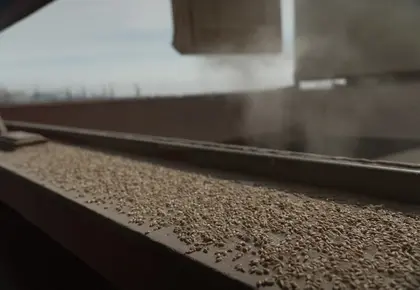Poland on Friday resumed the transit of Ukrainian grain and other food through its borders, partially lifting a near week-long ban imposed in response to protests from farmers.
Poland and other European Union countries bordering Ukraine imposed temporary bans on Ukrainian grain exports after farmers protested a slump in prices related to the influx.
JOIN US ON TELEGRAM
Follow our coverage of the war on the @Kyivpost_official.
Ukraine has transported such exports across EU borders since Russia's invasion disrupted its usual Black Sea shipping route.
Polish authorities said Friday the transit of dozens of food items -- including sugar, meat, fruits and vegetables -- is now permitted, but Ukrainian exporters still cannot sell the listed products on the country's market.
"We assume that the check-ins will be quite smooth, so far there is no signs that queues will form," Bartosz Zbaraszczuk, head of the Polish customs agency told RMF24 radio.
The transit was allowed at 2:00 am (0000GMT) when the government regulation lifting the ban on transports entered into force.
Poland on Saturday banned entry of dozens of food items from the war-torn country, and Hungary, Slovakia and Bulgaria followed suit with similar moves.
But Warsaw and Kyiv announced a deal Tuesday to allow the transit through Poland, under strict checks and controls, involving placing electronic seals on the transports.
Additionally, Polish customs officers will, for a week, escort the vehicles carrying exports.

Ukrainians Repel Russians in East, Destroy $77M in Weaponry as Glide Bombs Target Kharkiv Region
"We will let such a transport out of our sight only when it enters the port to be loaded, for example grain onto a ship, or leaves the Polish border," Zbaraszczuk said.
But protesting farmers said letting the transit flow might do further harm to Polish exporters.
"This will not relieve the situation on our farms, in our warehouses," Wieslaw Burzynski from the Pomeranian Chamber of Agriculture told reporters on Friday.
"Because grain and Ukrainian products will enter into competition with our products," Burzynski said.
In a bid to placate the farmers, Polish government on Friday announced a fresh batch of farming subsidies worth 10 billion zloty ($2.38 billion) and urged the European Union to approve the measures.
"The authorization must come from the European Commission so that a European clerk does not knock on the farmer's door somewhere and demand the return of the payment," Polish Prime Minister Mateusz Morawiecki told a press conference.
The populist right-wing government in Warsaw has accused the EU of failing to help the farmers.
It also drew criticism from Brussels for imposing the import ban unilaterally, without consulting Kyiv or the EU.
You can also highlight the text and press Ctrl + Enter






